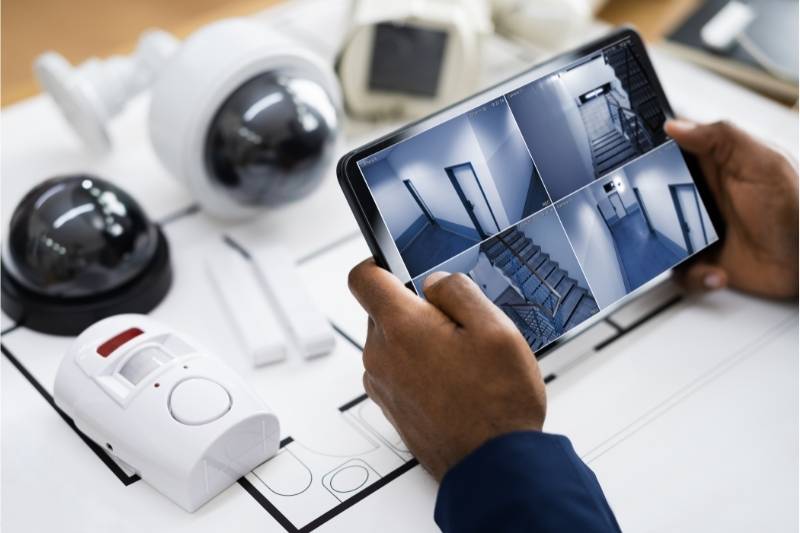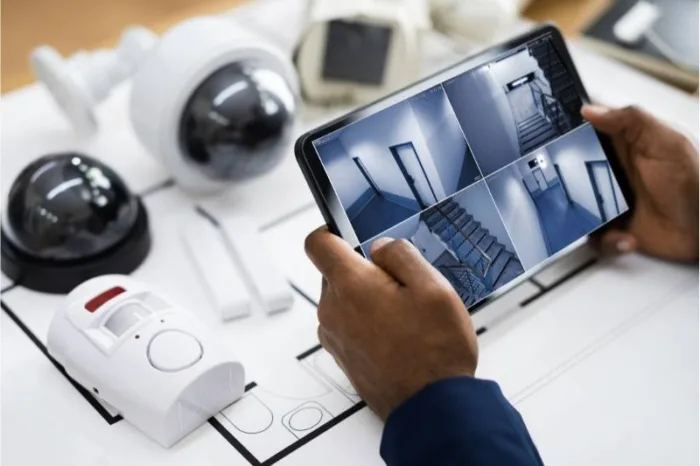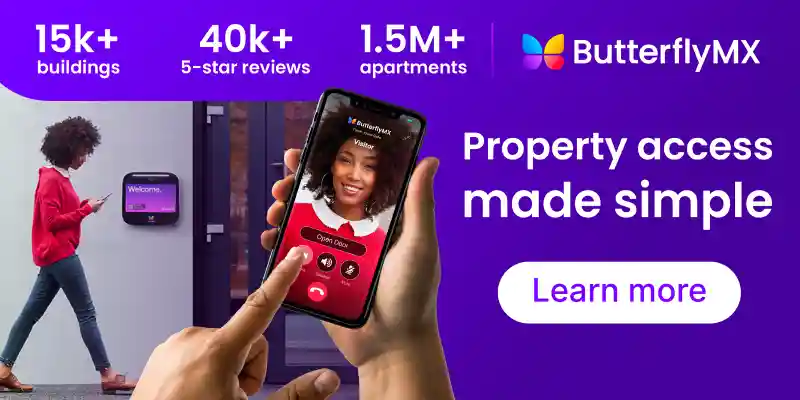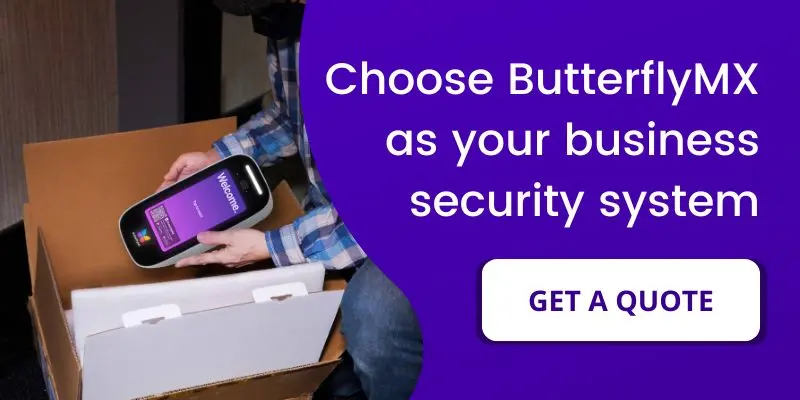Key takeaways
- Business security systems are essential in quickly resolving investigations of security breaches.
- Choose a security system that uses smart technology, supports keyless entry, and incorporates video.
- On average, a security system for your business can cost between $1,300 and more than $2,500.

A robust business security system is one of the most important investments you can make for your business. From small businesses to enterprise commercial properties, the right physical security system will protect all aspects of your business.
This guide will tell you the five best business security systems for big and small businesses. Additionally, we detail what to consider when choosing a security system and its importance to your investment. Lastly, we cover how much a security system will cost your business.
This post covers:
- 5 best business security systems
- Why do businesses need security systems?
- Considerations for choosing a security system
- How much does a security system for a business cost?
- Business security system FAQs
5 business security systems
There are many building security system vendors. To help you narrow down your options, we’ve assembled a list of some of the more popular ones.
Five security system vendors to consider are:
1. ButterflyMX
ButterflyMX offers modern, high-end access control products that are simple to use. Furthermore, ButterflyMX has been installed in over 15,000 properties and has over 40,000 five-star ratings.
With a multipurpose platform, ButterflyMX is focused on property-wide safety. You can expect cost-effective security and convenient access.
With mobile-based access, quick system installation, and two-way video communication, ButterflyMX is your commercial space’s most robust security system option.
Further, with ButterflyMX’s Front Desk Station, you can view live video feeds of your intercoms all in one place and speak directly with visitors and residents whenever necessary via the ButterflyMX Video Intercom.
Top features and benefits of ButterflyMX
- Advanced video security. The Video Intercom takes time- and date-stamped photos of all entry events, providing a detailed audit log of those entering your property. Meanwhile, our Security Cameras record 24/7 but are tethered to access events, allowing you to easily see the footage that matters to gain additional insight into how users access your property.
- Multiple credentials. ButterflyMX’s Access Control products accept various credentials, such as our mobile app, PIN codes, key cards, and fobs. Thus, your business can use the credentials you prefer to maximize security without compromising convenience.
- Cloud-based technology. Access Control data and Security Camera footage are stored in the cloud, removing the need for on-site storage. You can also manage permissions, review footage, and even grant access remotely, enabling a remote team.
- Quick installation. The full suite of ButterflyMX products is easy to set up. For instance, our Security Cameras only require a single PoE connection, so installation is less intrusive than other offerings.
- Durability. All ButterflyMX products are built to withstand the weather in all conditions, so you can expect them to last in extreme temperatures, heavy precipitation, and more. Moreover, our Security Cameras feature tamper- and impact-resistant housings to prolong their lifespan and protect your property.
- Property-wide access. ButterflyMX stands out from other business security systems by offering a property-wide access solution. In other words, our Access Control System enables access throughout your property, no matter the area or entrance. With our solution, you can manage access to your front door, garage, gate, elevators, amenity spaces, and more.
- Centralized platform. Manage your ButterflyMX Security Cameras and Access Control from a single operating system. This way, you have a solution streamlining your building operations while resolving security issues faster.
2. ADT
ADT offers highly specialized commercial-grade security. Its main focus is retail and food-industry security, but it also offers self-installation in many cases.
ADT features include:
- Video surveillance technology with 24/7 security monitoring for your peace of mind.
- Flood monitoring technology that notifies you of flood-related emergencies and empowers you to protect your assets.
- Intrusion alarms that automatically notify you of potential threats and security incidents.
- Remote access management that empowers you to control access from anywhere in the world.
3. SimpliSafe
With numerous security camera monitoring options, SimpliSafe gives you flexibility in how you apply its security system. It offers a basic security option, which is good for small businesses. However, it may lack building-wide capabilities.
SimpliSafe features include:
- This DIY security system is helpful for small businesses by reducing installation costs.
- The SimpliSafe app allows you to control your system while monitoring its status from anywhere.
- Compatibility with smart devices like Alexa and Google Assistant.
- 24/7 monitoring service with a faster police response using their Fast Protect Technology.
- A full suite of products to cover the needs of renters and their apartments.
4. Brinks
This company stands out because the system can be integrated with security equipment. However, Brinks’ non-negotiable three-year contract to use services could be a deal breaker for would-be clients.
Brinks features include:
- 24/7 security monitoring and Response Center so that customers feel safe no matter the time of day.
- With the app, users can arm and disarm the system remotely. However, the app is better suited to single-family homes and small businesses.
- Brinks utilizes indoor, outdoor, and doorbell cameras for added visibility around the property.
5. Vivint
Vivint offers expert inspections and the latest in smart technology. However, its biggest con is the long contract you have to enter to use its services.
Vivint features include:
- Doorbell camera that makes it possible to view visitors and guests as they request entry.
- Vivint monitoring and cellular backup that keeps data about entry events secure.
- iOS and Android compatible app, plus compatibility with smart voice command devices.
Watch how ButterflyMX works:
Why do businesses need security systems?
A security system is important to protect a business from theft, property damage, and other hazards. Over 34% of burglaries affect businesses and commercial buildings.
So, a business security system helps resolve investigations sooner, saving you the physical, emotional, and financial stress of dealing with such a traumatic event.
What’s more, a security system is also a requirement in some insurance policies. For example, some insurance policies require you to prove that you’ve taken reasonable measures to secure and protect your business from theft or damage.
Even if it’s not included in your insurance policy, presenting video surveillance — that you have thanks to your security system — can also expedite insurance claims. Further, video footage can help police catch potential offenders faster.
Considerations for choosing a security system
While the above list of vendors portrays popularity, it doesn’t guarantee they’ll be your business’s best choice. We strongly recommend finding a quality business security system company that includes every feature we mention below.
Features of the best business security systems include:
- Video technology. A security system that doesn’t include some level of video recording is outdated. Additionally, video footage is the best evidence when reporting an incident at your property.
- Locking and door release mechanisms. A good security system will ensure that only you and authorized personnel can enter. And it’ll do this without hindering access or making it difficult for all building occupants.
- Smart technology. By smart, we mean that you can control it from your phone. Monitoring your property from your mobile device is highly convenient and allows you to monitor your business anywhere.
- Keyless entry. Digital keys can be accessed through a mobile device, eliminating the worry of forgetting keys—or, worse, the hassle of losing them.
- Easy access. Security systems should never feel intrusive or difficult to use. They should only be visible enough to make employees, clients, and customers feel secure and ward off potential criminals. Further, the systems should be intuitive and easy to train employees on.
- Integrations. Choose a system that integrates seamlessly with other security hardware and software your business uses. This way, you can centralize business operations, reducing workloads and increasing productivity.
How much does a security system for a business cost?
On average, business security systems cost anywhere from $1,300 to $2,500 upfront. Additionally, you can expect to pay up to $60 per month for system upkeep. While this is a significant upfront investment, it could save your business tens of thousands of dollars in damage protection in the long run.
Keep in mind the cost of a commercial security system depends on several things, including the size of your business and whether you invest in a robust or basic system
Business security system FAQs
- How do I secure my small business?
- How much should a company spend on security?
- How much does it cost to install a commercial security camera system?
How do I secure my small business?
Whether you own a bustling restaurant or run a daycare, there are many easy ways to implement security at your small business.
These are the primary ways to secure your small business:
- Educate employees. Train your employees to recognize security threats, secure sensitive information, and maintain strong passwords through frequent training sessions.
- Invest in security features. Implement robust security systems, including security cameras, access control systems, alarms, and cybersecurity measures like firewalls and antivirus software.
- Develop and enforce security policies. Establish and communicate clear security policies and procedures, ensuring consistent enforcement to protect sensitive information and access to restricted areas.
- Perform regular security audits. Hire a third-party security company to conduct regular security assessments to identify and address vulnerabilities in your organization.
- Secure your digital presence. Protect your online presence and business data with SSL certificates, strong passwords, regular software updates, and two-factor authentication for sensitive accounts.
How much should a company spend on security?
You should spend 7% to 20% of your budget on security solutions. The budget you set, the size of your business, and the nature of your work will determine the kind of investment you should make in security features.
How much does it cost to install a commercial security camera system?
The cost of installing a commercial security camera system varies widely depending on your needs, the size of the business, and the complexity of the installation. To better understand the cost of your security camera installation, contact a professional installer for a quote.







